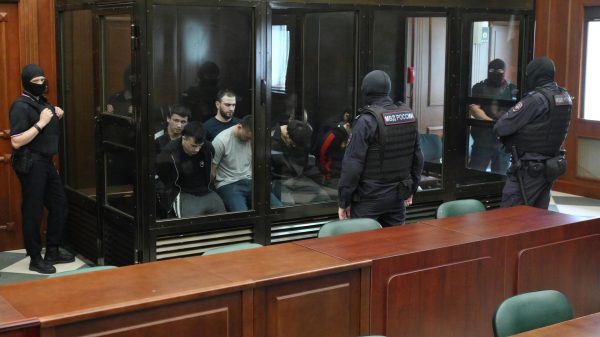 Abandoned: Wicked is an abandoned film set in Buckinghamshire in July after the strikes. Photo: Leon Neal/Getty Images
Abandoned: Wicked is an abandoned film set in Buckinghamshire in July after the strikes. Photo: Leon Neal/Getty Images
Hollywood strikes are easy to write off as irritable mistresses frightened by the real world. When the likes of Brian Cox, Andy Serkis, Hayley Atwell, David Oyelowo, Simon Pegg, Naomie Harris, Imelda Staunton and Rob Delaney gather in Leicester Square to deliver chilling speeches in support of outstanding American actors, it can seem a little ridiculous.
And yet, the longer the strike goes on, the more damage it does to the UK economy. Ever since the Screen Actors Guild left on July 14 to join the Writers Guild of America on picket lines, Hollywood — the oldest and richest entertainment industry in the world — has simply shut down. The money Los Angeles expected to pay for movies and TV shows in 2023 was estimated at $240bn (£190bn) — roughly the turnover of Google, almost double that of Ford and four times that of Boeing. Given that London is the third largest production center in the world, studios across the country as well as film and television crews are routinely ranked as the best in the world in industry surveys, some of which were directed at us.
In 2022, domestic investment from Hollywood into films and high-quality television was £5.37 billion, according to BFI data. Los Angeles studios spent £3.62 billion building television here, while British companies spent £632.7 million. US films spent £1.74 billion in UK studios and locations, while domestic films accounted for £173.6 million. In 2023, the pace of investment was the same as in the first quarter, which suggests that the closure in the second half of the year will cost us almost £3 billion.
The major UK studios are hosting major US productions, all of which are currently on hold. These include Deadpool 3, which was filmed in Pinewood, Tim Burton's sequel Beetlejuice, Brad Pitt's Formula 1 drama Apex, the follow-up Mission: yellow bricks now lie in ruins in the Buckinghamshire countryside. Television shows currently in production and at risk are the second season of Andora and Eddie Redmayne's The Day of the Jackal. For electricians, laborers, film crew and sound engineers, almost all of whom are freelancers, this has been a dramatic financial shock.
“We all knew it was coming,” says the focus puller who works on studio blockbusters. “There are always a couple of actors on set who get along well with the crew, so they will fuel rumors of negotiations. In the movie I'm doing, some of the crew had a couple of extra days to secure the set, but most of us were just sent home that day, told not to come tomorrow. The studios call it a hiatus, so we're still under contract, but we're not getting paid and we're not allowed to work for anyone else. Some crews provide their own equipment, and some studios refuse to let them take it off the set. So they lost both their jobs and their equipment.»
 Production on Brad Pitt's F1 drama Apex has been halted. Photo: Dan Mullan/Getty Images
Production on Brad Pitt's F1 drama Apex has been halted. Photo: Dan Mullan/Getty Images
In theory, only screenings where the actors and writers are members of the SAG or WGA are affected. In practice, thanks to the efficient closed shop in Hollywood, no British talent eyeing American studios or streamers wants to be labeled a strikebreaker. This is especially true for writers—since 1941, the WGA has controlled who gets the copyright on a play. No credit, no balance, so while the likes of Jack Thorne, Russell T Davis, Simon Beaufoy, James Graham, and Sharon Horgan have put their pencils down in solidarity, it's fair to say they put their pencils down to secure their careers when the strike ends. While the UK divisions of American streamers such as Netflix and Amazon are not «affected companies», with some UK projects where contracts are awarded on terms set by Equity (the British actors' union), individual members of the SAG are «too scared to work». according to one manufacturer.
As a result, Philippa Childs, head of Bectu, a trade union for support staff and freelancers in the sector, says filming has almost completely stopped. She argues that the problem with Hollywood's huge domestic investment is that it has affected the UK's own film and television production, which is now so dependent on US money that purely British production is «almost non-existent». As a result, our members work in bars, shops and supermarkets because they are desperate.”
And ancillary services that rely on US money, such as the UK post-production sector, which does everything from grading — ensuring color tone consistency — to CG, are quickly channeled into buffers.
 Before and after: The Wicked set in April 2023 compared to the set now on strike. Photo: Leon Neal/Getty Images/GroupFTP
Before and after: The Wicked set in April 2023 compared to the set now on strike. Photo: Leon Neal/Getty Images/GroupFTP
“We were immediately affected by the strike of the actors,” says the boss of one of the London houses. post production company. The company is working on «dailies» for a couple of films — shots taken in a day need processing and editing. “They stopped coming, so half of the company has nothing to do,” he explains.
According to DCMS data published in April this year, before the pandemic, industries controlled by the Ministry of Culture, Media and Sports accounted for a tenth of UK GDP. Between 2016 and 2019, the creative industries significantly outperformed the UK economy, growing by 22.8% from a total of 10.4%.
In a December 2021 report aimed at making the case for tax incentives for the film sector, the British Film Institute commissioned Olsberg SPI to analyze the overall economic contribution of film and television to the economy. The report broke down the cost of a £100 million Hollywood feature film and showed that only 39.83% of its total filming budget is spent on screens, i.e. spent on payments to people and companies that work exclusively in film and television. . Along with cash flow directed to obvious ancillary industries such as music, fashion and beauty, about 40 percent of the budget went to areas such as training and education, utilities, travel and transportation, security, finance, law, health and medicine. construction and local labor force. .
 The second season of the Star Wars prequel Andor is currently on hold due to strikes. Photo: Disney+
The second season of the Star Wars prequel Andor is currently on hold due to strikes. Photo: Disney+
Stopping filming has a wider, intangible impact. While the Barbie stories, filmed at Leavesden Studios near Watford and causing a global pink paint shortage, were grossly exaggerated, the film emptied the stocks of southeast London-based Rosco. And then there's film tourism — overseas fans book holidays in the UK to visit places or watch their favorite shows being filmed. The BFI estimates that incoming tourists spent just under £600 million on film tourism in 2019.
For example, the relaunch of All Creatures Great and Small has an audience of 10 million or more on the PBS network in the United States. When the show is filmed in Grassington, who is posing as Darrowby, the cast says it feels like a «theatre performance» since so many American fans come to watch the set. On the set of the third series, Nicholas Ralph, who played the veteran James Herriot, met with families who had booked holidays in the UK just to be able to stay in the area, get to know the countryside and see what was going on there. And when the strikes are over, the money can pour back in.
«There's been such a big uptick, especially among streamers, that they've taken advantage of the strike to reset the settings and rein in the situation,» explains Ed Waller, editor-in-chief of the C21 industry bible. media. “It doesn’t look like everything will go back to pre-pandemic or even pre-strike days after it is cancelled. There is likely to be less US investment soon.”
Bektu urges the government to ensure that when the money comes back, the industry waits. “This is a freelance industry and we need to support them or we will lose them,” Childs says. “One of the most attractive aspects of the UK is the talent of the crew. If they leave, we will see less money coming in overall. That's billions of pounds and thousands of jobs that could go overseas if we're not ready.»






















































Свежие комментарии